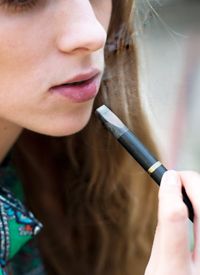E-Cigarettes: What Are the Health Effects? Study Seeks to Find Out
Upcoming studies at OSUCCC – James aim to determine the health effects of "vaping," smoking electronic cigarettes (e-cigarettes, or e-cigs) as compared to traditional cigarettes and on their own.
E-Cigarettes: What Are the Health Effects? Study Seeks to Find Out

A recent national consumer survey noted that 44% of Americans under the age of 35 consider e-cigarettes to be less harmful to the lungs than traditional cigarettes. Upcoming studies at The Ohio State University Comprehensive Cancer Center — Arthur G. James Cancer Hospital and Richard J. Solove Research Institute (The OSUCCC – James) aim to discover the health effects of using e-cigs and are currently still recruiting healthy volunteers.
“We have no idea where in the spectrum these are, in terms of safety. Are they like cigarettes, or nothing like cigarettes? Do they affect people the same if they’ve never smoked, or a lot worse? We need to figure this out,” said Peter Shields, MD.
Even the question of whether or not e-cigarettes contain toxic elements isn’t so simple, Shields, a thoracic oncologist, cancer control researcher, and deputy director of The OSUCCC — James explained in an interview with Oncology Nursing News, “It’s not only whether there’s something ‘bad’ that’s there, but how much?”
An e-cigarette contains carriers for nicotine—propolyn-glycol and glycerin—and flavoring. The carriers are considered safe when coming in contact with skin or when eaten. However, as Shields added, “We don’t know if they’re safe when inhaled. The lungs don’t have the same barriers as your skin and your stomach, to prevent from being harmed.”
There are also concerns about breakdown products, which depend upon how much electricity is applied and how heated the e-cigarette gets. Those breakdown products, according to Shields, are acrolein, acetaldehyde, and, “depending on how high the electricity goes, you could get something like formaldehyde.” Acrolein and acetaldehyde are not considered human carcinogens, but they are irritants. “Irritation is part of a cancer pathway, but those chemicals are just not strong enough by themselves to cause cancer—in animals, at least.”
However, formaldehyde is, “considered by some authorities and regulatory agencies as a human carcinogen for leukemia,” Shields explained. It is uncertain if the levels of formaldehyde that an e-cigarette can produce are enough to be of concern.
Currently, most studies about these substances are done in laboratories, as machine studies. “They do their best to replicate how people smoke e-cigarettes, but that's really hard,” Shields said. At The OSUCCC — James, they are conducting human studies to better determine the health effects.
The first study will compare the lung tissue of nonsmokers, e-cigarette users, and traditional cigarette smokers. To directly assess the impact of tobacco and e-cigarettes on the lungs, researchers will be performing bronchoscopies on the volunteers. This medical procedure allows researchers to view the airways and collect a small sample of lung cells from fluid in the lungs.
The nonsmoker volunteers in this study will also be asked to use an e-cigarette that uses no nicotine or flavor for 1 month before undergoing another bronchoscopy.
From the results of those studies, Shields hopes to see the levels of differences and determine “whether we need to do a bigger study to get a better handle on what is the comparison between those 3 groups.”
The second study will consist of 2 phases—a baseline phase and an 8-week clinical trial. Participants will complete questionnaires and provide urine and mouth cell samples. From there, participants will be randomized to 1 of 2 groups: an arm that will switch to e-cigarettes or an arm which switches to medicinal nicotine via gum or lozenges for 8 weeks.
“This study,” Shields said, “is aimed at identifying how different methods of using tobacco impacts the exposures that happen when smoking the product or using e-cigarettes.”
The OSUCCC — James hopes that these trials will provide data to help science, “catch up with the consumer market,” as Shields put it, “and determine whether e-cigarettes truly are a safer option than traditional cigarettes.
“The field is moving fast,” Shields commented, “and we just don't know. Some of these questions, maybe we'll never answer.”
To learn more, visit cancer.osu.edu/ecigs, email ecig-study@osumc.edu or call 1-844-744-2447.



